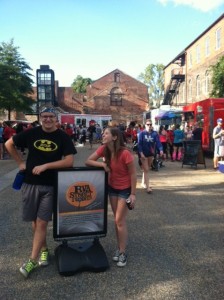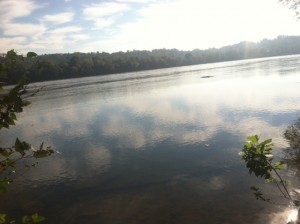John Wesley Powell: A watershed is “that area of land, a bounded hydrologic system, within which all living things are inextricably linked by their common water course and where, as humans settled, simple logic demanded that they become part of a community.”
I used this quote in my first ever blog post, and the theme it highlights, community as dictated by watershed, has been the overarching theme coloring my perspective throughout this course. Where I come from educationally ensured that this would be a strongly held value of mine, that secured my understanding of new or novel concepts. I related everything back to how it affects community. But this course has grown past the University community, or the Earth Lodge community, that I have spoken so much of in my blogs. Within our watershed, we are a community. The community within the University, or the city of Richmond, is linked to its watershed, whether it be the Little Westham Creek or the James River Watershed. In the past weeks, my perception has changed. It’s not just our small little community that I need to pay attention to, or in which I can effect change. Breaking the world into bite-size chunks of townships and counties and 6 digit hydrologic unit codes is a tool we use to understand the world and affect change on what we can. It makes us feel big. If the surface of the world is 70% water, then all the land is its watershed. Meaning “all living things are inextricably linked.” The small scale is helpful and important. Volunteering at our local river, gaining field experience in the closest and most diverse watershed we can. But the world is larger than that, and so is the impact that we, as human, international community, have on it.
Marissa said in her service blog, “You must love nature before you want to protect it. You must be connected to an area before you’re willing to save it.” Between readings, service, and field work, Geography of the James River watershed, more informally known as Earth Lodge class, has connected me to nature and my watershed in a way I don’t think I ever would have otherwise been. My most successful service experience as the JRA Splash and Dash, and one of my best memories of the semester, really drove this point home for me. I had never seen that much of Belle Isle, which I think is probably the best recreational area along the James. There are so many things you can do there, and so much of the river and fall line to be seen. Our start of year kayaking trip and this volunteer experience are what first opened my eyes to everything the James has to offer in a recreational sense. I feel this aspect may be the most important of a watershed, because in reality, more people will appreciate a place for what it can give them than what they can give it. And making people aware of a place and what is has to offer is the first step to getting them to protect it. “Volunteering at the Splash and Dash made me realize how little people around here know about this great thing right in their midst.” That service opportunity was one that married civilization and nature. It was a 5k literally in the James, so there was no way it could avoid that marriage.

Garrett and Heather at the JRA Splash and Dash (Christopher and Myself present but not included in picture)
The reason I didn’t enjoy my second service project as much was because our task separated us, and the community, from nature. I understand the practicality of raking leaves—preventing kids from slipping on the wet leaves by the road, making the place look cleaner, safer and more approachable so its wonderful services could be better utilized. However, raking leaves by its very nature is separating humanity from the environment. We don’t want your mess, nature. We need our order and neatness so we can do our job. It wasn’t that bad, and I don’t mind raking or helping a place like the William Byrd Community House, but that’s the reason it was not a great service experience.
That was just about the only time anything connected to this class separated nature and humanity. Another marriage of the two was my reflection spot. A garden links nature and humanity so closely and so practically that neither can work without the other. There is more bounty when a gardener tends to the plants. You can just see that the two need each other by comparing the uncared for, weedy plots with the carefully tended ones.

Picture taken at the UR Garden, my reflection spot. The left plot was clearly neglected, while the right plot was cared for.
These experiences reiterated my, and our, connection to the James, but other aspects of the class brought to my attention our impact, and globalized what I learned locally from the James about humanity’s relationship to and impact on nature. The In River Time readings brought to my attention the rich history of and incredible impact humans have had on the James River. At one point it was called an “open sewer,” and we caused that. Furthermore, even though we did cause it, it wasn’t until we could no longer ignore the James’ problems , and the Clean Water Act was passed, that we really seriously understood our impact and started to clean up. I wish I could’ve gone on the Potomac Fall Break Trip, because I’m sure the fieldwork done there would’ve further reiterated how much of an impact we have on our watersheds. As it is, I now understand the significant impact a new 100-car parking lot, or impervious surface, has to a watershed. Or what an upstream farm can do to a population of sturgeon or oysters. The report cards of the James and the Potomac illustrate this beautifully. With the terrible grades both received on nitrate/phosphorous pollution, I for one am concerned. The problem is, I doubt an average citizen of those watersheds reads them. Only people who utilize those rivers will be concerned, whether they work with the rivers or they simply go tanning there. Outdoorsey-types—people who camp, hike, bike, or climb—those people might read that report card and change their behavior accordingly. But someone who simply lives near it, or walks their dog there occasionally, won’t really notice the state of the river unless it hits them between the eyes. Like at “open sewer” James did way back when. And I certainly don’t want it to get that bad.
Studying these two watersheds have made me more aware of my impact, but the GESS lecture by Jeffrey Kerby about how melting arctic sea ice affects local large mammal populations and discussion in class with Ikal Angelei about trying to save Lake Turkana in Ethiopia/Kenya, along with readings and class, globalized my understanding of my relationship to water, watersheds, and the natural world in general. Ikal Angelei gave me a sense of the politics of an ecological effort, and the importance of ecology to many communities. We don’t go to the James for drinking or cooking water, and most of us don’t/won’t make our living through fishing or other river-based trades. The USA has become so technologically dependent that we create our own jobs, stock brokers selling stock of companies inventing new applications for cell phones. None of those trades are particularly environmentally dependent. In Ikal Angelei’s community, many of the citizens are environmentally dependent. A dramatic change in the environment means the loss of incomes, even drinking water. It’s a big deal.
Kerby and the in-class video “Melting Arctic: Assessing the Global Impact,” spoke less towards the political end and more toward how humanity as a whole is impacting our entire planet. Climate change is more rapid in the arctic than the rest of the world because of how the snow reflects the sun. The greenhouse gases create a situation that melts the snow, which prevents reflection of suns’ rays, rays which instead warm the land and sea and melt more ice and snow, exacerbating the issue. Melting see ice means local mammals cannot reproduce efficiently, or feed efficiently, and may die out. Globally it means slower moving, stronger storms, droughts, and other big changes which will cause the same local changes as in the arctic: animals may not be able to feed/reproduce efficiently and may die out, among other implications. Change is happening too fast, as in dramatic sea ice decline in the last 15 years fast. Adaptation takes 1500 years. We’re causing this, and we won’t be able to adapt. That nitrate/phosphorous problem in the Potomac/James, or rather, pollution and negligence problem, exists on a global scale.
These things that I’ve learned are the new lenses to my thinking. My perspective is not just about our University or city community, but the global community. The Earth as our home, one that is seriously in need of spring cleaning and maybe even some construction work. When my econ major friends scoff at my rants for sustainability, I have resources and knowledge to back up my claims. I don’t always make them back down, but I’ve gained ground in raising awareness among my own social circle, and definitely in changing my own way as much as possible. Nothing I do alone can make a big impact, but encouraging others to, and educating others, could. My central point is this: If we all are ‘inextricably linked’ by our ‘common water course,’ then why is it that we never work together to preserve our home? The Earth is in trouble. That is clear. We need a better relationship with each other, and the earth, but instead we are constantly at war. Econ majors are constantly scoffing at humanities majors. Values are being sacrificed for practicality and individual profit. But the world is starting to hit people between the eyes and say, “Time to pay attention.” That’s what this class has done for me. And its what we should all now do for others. We do affect nature, both locally and globally. We do have access to an incredible resource, the James, or whatever is in your town or city. Just look at our access points map within the city of Richmond, and all the attributes each point has: biking, climbing, hiking, fishing. Every community has something similar. Back home, it could be the Delaware River, or the Brandywine. Maybe just Valley Forge Park. People can use and have fun in those places, if they are aware of them. The more people who start doing that, the more people will become aware of the problem facing their homes, and want to help. The more people who do that, the more people will become aware of the world as their home, and want to help. Slowly but surely the world can become a better place. They just need a change in perspective.



This is an amazing blog entry Hill! It really is time to pay attention. And like you said, it is almost a butterfly effect sort of change that needs to happen. As some people change perspectives and make others aware of their impact, those people will go on and act on their changed perspective and in turn change the perspectives of others. Awareness will increase as a whole and that is just the start of making the world a better place. 🙂